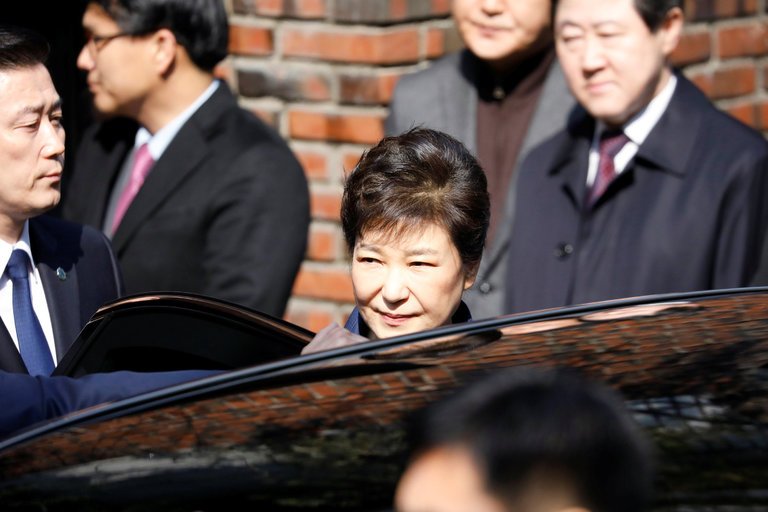This material belongs to: The New York Times.
SEOUL, South Korea — Two South Korean spy chiefs who served under Park Geun-hye, the impeached former president, were arrested Friday on charges of illegally channeling tens of thousands of dollars a month from their agency’s secret budgets for Ms. Park’s private use.
The arrests resulted from a campaign by Ms. Park’s successor, President Moon Jae-in, to root out what he called collusive ties between the president’s office and the National Intelligence Service, long accused of meddling in domestic politics.
The former spy chiefs, Nam Jae-joon and Lee Byung-kee, were accused of delivering monthly payments of $45,500 to $91,000 to Ms. Park while they were serving as directors of the National Intelligence Service. The money was taken from the agency’s “special operational funds,” which were intended to finance undercover assignments and were not scrutinized by parliamentary or other outside auditors, prosecutors said.
Lee Byung-ho, another former spy chief who served under Ms. Park, faced the same accusations. But a judge did not approve his arrest on Friday, saying Mr. Lee was not at risk of fleeing the country or trying to destroy evidence if he was free awaiting trial.
Prosecutors planned to indict the three former spy chiefs on charges of misappropriating a total of $3.6 million from their agency’s budgets and offering the money as bribes to Ms. Park when they were leading the agency between early 2013 and September of last year.
Two of Ms. Park’s presidential aides were arrested on Nov. 3 on charges of collecting the monthly payouts, delivered in cash in briefcases, from spy agents near the presidential office.
Ms. Park has become a symbol of abuse of presidential power since huge crowds began gathering in downtown Seoul last fall calling for her ouster. The National Assembly impeached her in December. She was formally removed from office in March and was later arrested and indicted on a number of charges, including bribery and extortion.
Ms. Park is now on trial on charges of collecting or demanding $52 million in bribes from Samsung and other big businesses while she was in office. The scandal that led to her downfall rekindled public furor over decades-old ties between government and corporations. Samsung’s top executive, Lee Jae-yong, was convicted in August of bribing Ms. Park and sentenced to five years in prison, but he has appealed, and his trial continues.
Mr. Moon, a former opposition leader, came to power in May by winning a snap election called after Ms. Park’s impeachment. He campaigned on the promise to eradicate the abuse of presidential power and other corrupt practices.
The former spy chiefs have denied the bribery accusations, saying that they believed the payments were legal and that the money would be used for legitimate purposes. But their arrests further sullied the reputation of the National Intelligence Service.
Ms. Park’s father, the late military dictator Park Chung-hee, who ruled South Korea from 1961 to 1979, established the agency in 1961 to catch spies from North Korea and fight Communist influence. But the agency also kidnapped and tortured domestic dissidents, often framing them with false charges of spying for the North.
All succeeding governments have been accused of abusing the intelligence agency to help strengthen their grip on power. A handful of former directors of the agency have been convicted of corruption and abuse of official power, including illegally wiretapping the conversations of politicians and others. The former director Kim Jae-gyu was executed for assassinating Mr. Park in 1979.
Recent presidents have all vowed to reform the National Intelligence Service, but the agency has been plagued by recurring scandals.
On Tuesday, a former senior official of the agency was indicted on charges of arranging for big businesses to provide donations to right-wing civic groups that organized rallies in support of the conservative government of President Lee Myung-bak in 2011 to 2012. He was also accused of plotting to stop television and radio stations from hiring entertainers deemed unfriendly to the government.
Another former director of the agency, Won Sei-hoon, also got into legal trouble.
In August, Mr. Won, who served under former President Lee, was sentenced to four years in prison on charges of ordering a clandestine online campaign to help the 2012 election of Ms. Park, a fellow conservative.
In the run-up to the December 2012 election, Mr. Won directed a secret team of psychological warfare officials of his agency to work with hired private bloggers on an online smear campaign against Ms. Park’s political rivals, according to the prosecutors’ indictment.
In a related case, Kim Kwan-jin, who served as defense minister under Mr. Lee, was arrested on Saturday on charges of directing members of his military’s cyberwarfare command to begin online operations similar to the intelligence agency’s.
Mr. Kim continued to serve as defense minister after Ms. Park’s election and later became her top national security adviser.
An earlier version of this article misstated the name of one of the companies from which former President Park Geun-hye is accused of collecting or demanding bribes. It was Samsung, and not Hyundai.
 info@anticorr.media
info@anticorr.media

